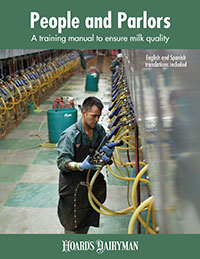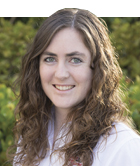
For that reason employee training has become a vital piece of the mastitis management puzzle. Trainings are most effective when they include up-to-date information, an application avenue, and a practical lesson.
The newest book from the Hoard’s Dairyman bookstore is the perfect resource for training employees in mastitis protocol. Authored by milk quality specialists Phil Durst and Ron Erskine, People and Parlors provides pertinent, dependable, and understandable information on the whys and hows of milk quality.
The information is broken into four sections encapsulating mastitis basics, parlor practices, treatment philosophies, and more. It pays special attention to protocols and tasks specific to each position on the farm from milkers to pushers, treaters, and managers.
More importantly, the design sets English and Spanish lessons in a side-by-side format that encourages learning for all employees.
At the end of the book, English and Spanish quizzes serve as an opportunity for manual users to apply their knowledge.
To learn more about the book and its contents, stop by the Hoard’s Dairyman booth at World Dairy Expo (Exhibition Hall 4327-4328 or Arena Level of the Coliseum 213-217). On Tuesday, October 4 from 12:30 p.m. to 2 p.m., you can visit with one of our expert writers, Phil Durst, at the Exhibition Hall booth. He will be on hand to discuss milk quality and on-farm training strategies.
You can also learn more about People and Parlors or purchase the book by visiting www.hoards.com/bookstore/PEPA. Additional resources for milk quality can be found at www.hoards.com/bookstore/milking.
